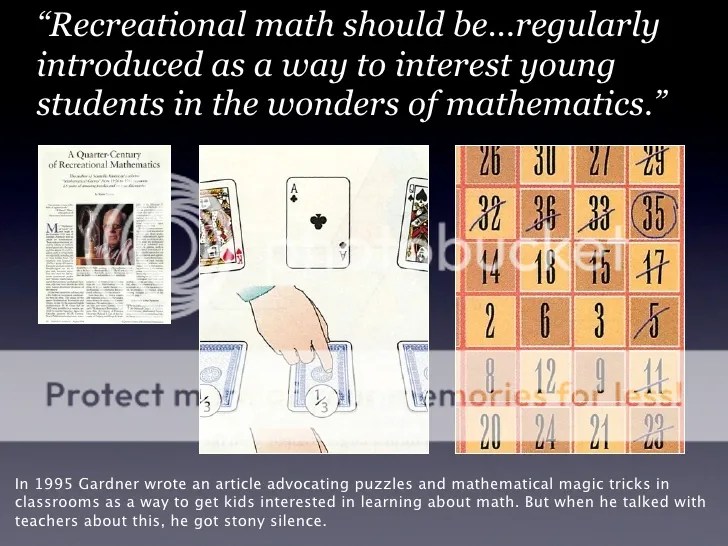
There was a wonderful opinion piece in The New York Times a few weeks ago about the importance of recreational math.
Now, as author Manil Suri said, I’m sure that to some people, the idea of recreational math sounds like an oxymoron. But it’s everywhere! From poker players calculating their odds based on the cards dealt to the number crunching in role-playing games in order to complete certain tasks (or develop a character’s skills), math is built into many recreational activities.
It’s certainly a part of many kinds of puzzles, including brain teasers. Heck, previous brain teasers featured here in the blog like Mystery Number, the Birthday Puzzle, and the jugs of water trap from Die Hard with a Vengeance would all easily fall under the umbrella of recreational math.

The article goes on to mention the wonderful work of Martin Gardner, whose column “Mathematical Games” in Scientific American was a mainstay of recreational math and puzzly whimsy for over twenty-five years.
From Suri’s article:
In his final article for Scientific American, in 1998, Mr. Gardner lamented the “glacial” progress resulting from his efforts to have recreational math introduced into school curriculums “as a way to interest young students in the wonders of mathematics.”
Indeed, a paper this year in the Journal of Humanistic Mathematics points out that recreational math can be used to awaken mathematics-related “joy,” “satisfaction,” “excitement” and “curiosity” in students, which the educational policies of several countries (including China, India, Finland, Sweden, England, Singapore and Japan) call for in writing.
In contrast, the Common Core in the United States does not explicitly mention this emotional side of the subject, regarding mathematics only as a tool.

This is an excellent counterpoint to the regular argument that the primary value of puzzle-solving and other activities (like recreational math) is to stave off brain health issues later in life.
In a previous post, we discussed the inconsistent reports about the effects of puzzle-solving on the brain, leaving it unclear if regular doses of puzzles and recreational math are beneficial for other aspects of brain health over time, like memory retention, neuroplasticity, and concentration.
That may well be the case, but Suri’s point stands. The idea of instilling a sense of fun and wonder into the field of math, especially for younger minds? That’s one worth pursuing.
Show them that math can be about more than fulfilling homework or graphing parabola. Show them that mathematical concepts can help you crack a diabolical seesaw brain teaser, save a village with a grain of rice, or find an alternate solution to a PSAT question and prove the testers wrong.
It has been championed in the past by television shows like Square One TV and MythBusters, but sadly, examples like that are few and far between.
And if we can instill recreational math as a key facet of math itself, then we’d be one step closer to ensuring that STEM courses will have plenty of participants in the future.
Thanks for visiting PuzzleNation Blog today! Be sure to sign up for our newsletter to stay up-to-date on everything PuzzleNation!
You can also share your pictures with us on Instagram, friend us on Facebook, check us out on Twitter, Pinterest, and Tumblr, and explore the always-expanding library of PuzzleNation apps and games on our website!

Pingback: Puzzles in Pop Culture: Square One TV | PuzzleNation.com Blog
Recreational math problems and puzzles are extremely valuable to learning how to solve problems, reducing complexity and confusion to the simplest possible elements. I often play with number patterns. Each number is unique and has its own beauty, and there are some well-known (and not so well-known) sets of numbers that have special properties. See some of these number curiosities: http://www.glennwestmore.com.au/category/number-curiosities/